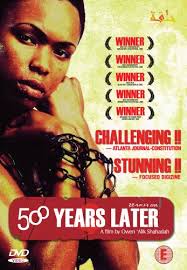 "500 Years Later" is a great documentary to watch for Black History Month. Instead of just focusing on blacks in the United States, historians and professors, students and professionals, follow Africans through the centuries all over the world starting from the slave trade. Blacks are not termed as African American or African English or African Belizean, but together as African descendants. Through watching this I learned that many of the race issues that African Americans face are faced by the millions of blacks around the world who have descended from enslaved ancestors. It brings up issues about the legacy of slavery, the absence of African history/philosophy/art/spirituality in our history books, and internalized racism. The documentary is very much supportive of the pan-africanist philosophy, which was a new take for me on how to approach black identity in a white world, but it broadened my perspective about who I have been as an African American and who I want to be as an African American.
"500 Years Later" is a great documentary to watch for Black History Month. Instead of just focusing on blacks in the United States, historians and professors, students and professionals, follow Africans through the centuries all over the world starting from the slave trade. Blacks are not termed as African American or African English or African Belizean, but together as African descendants. Through watching this I learned that many of the race issues that African Americans face are faced by the millions of blacks around the world who have descended from enslaved ancestors. It brings up issues about the legacy of slavery, the absence of African history/philosophy/art/spirituality in our history books, and internalized racism. The documentary is very much supportive of the pan-africanist philosophy, which was a new take for me on how to approach black identity in a white world, but it broadened my perspective about who I have been as an African American and who I want to be as an African American. "The Color of Fear" is a dialogue project between eight American males - black, white, Asian, and Latino - specifically discussing racism in the United States. This documentary is not about black history or Black History Month but serves as a good follow up to "500 Years Later," which left me asking many more questions about race relations in the U.S.
This film addresses and asks questions such as:
What does it mean to be white vs. a person of color in the United States?
What does it mean to be American?
What is the definition of racism?
Is there a solution to contemporary racism?
The conversation between these men forces us to redefine racism as we know it and confront stereotypes that we all have about others and even ourselves. This is a must see for every American.
Below is a trailer to the film.







 Madame Bovary
Madame Bovary Speaking Truth to Power
Speaking Truth to Power  Maya Angelou: Poems
Maya Angelou: Poems Black, White and Jewish
Black, White and Jewish  A Writer's Book of Days
A Writer's Book of Days 

